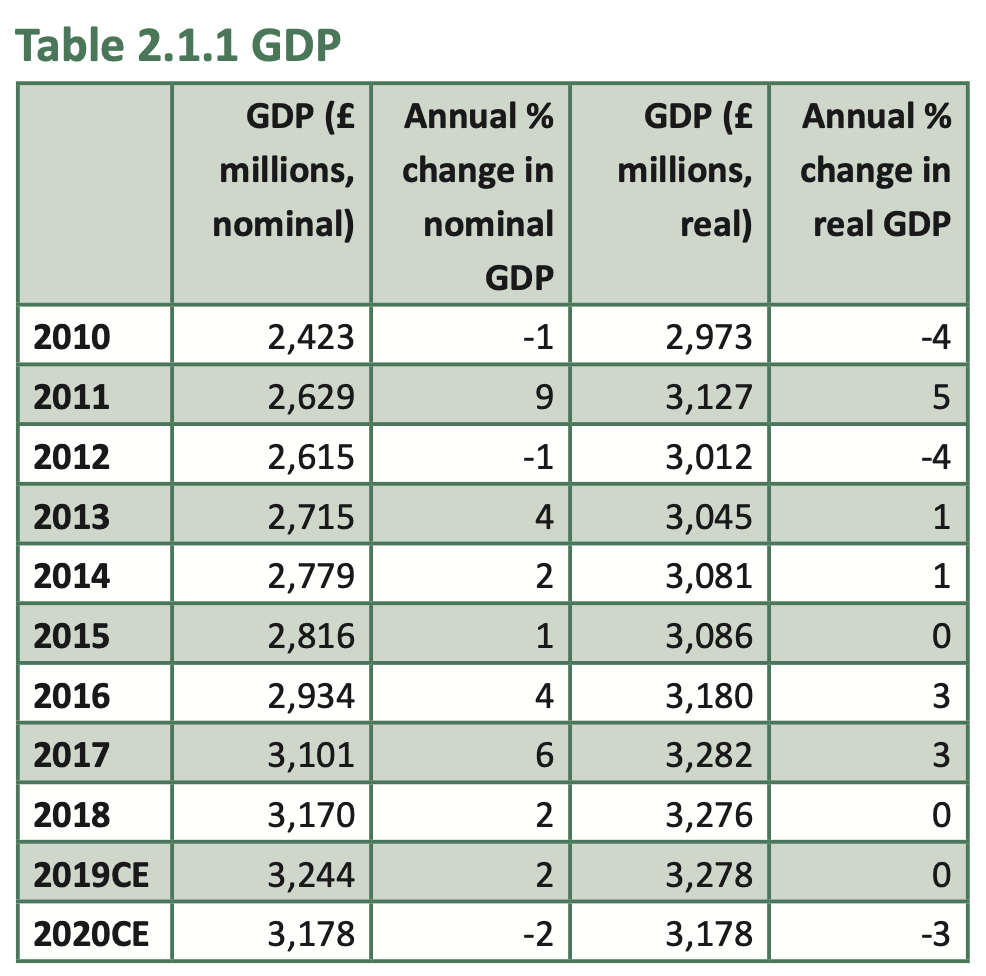


Guernsey's economy shrank by 3% in 2020 - significantly less than the States anticipated.
Deputy Mark Helyar, States' Treasury Lead, described it as "a particularly positive result" in a year dominated by the covid-19 pandemic.
Each year the States publish a report on the island's Gross Domestic Product, which measures the size of the economy, and Gross Value Added, which measures productivity.
Figures for 2020, published yesterday, reveal that the hostelry sector contracted by 33% and the transport and storage sector contracted by 22%. However, the finance industry, easily the largest sector of Guernsey's economy, shrank only by around 2%. Some sectors of the economy even grew in 2020, such as real estate activities, which increased by 3%, and information and communication, which increased by 4%.
When the pandemic forced the States to put the island into lockdown early in 2020, they also introduced schemes of financial assistance to protect businesses affected most. Deputy Helyar said that such actions by his predecessors helped Guernsey's economy.
“The publication of first estimates of GDP confirms the message in the Budget that Guernsey’s response to covid-19 has helped to mitigate the economic impacts of the pandemic,” said Deputy Helyar.
“A 3% contraction in our economy, considered in the context of the unprecedented level of disruption the pandemic has caused and relative to contractions in excess of 9% reported in our near neighbours during 2020, is a particularly positive result.”

Pictured: GDP - the size of the economy in Guernsey - has been estimated at £3,178 million (nearly £3.2 billion) in 2020, which in ‘real terms’ (i.e. taking into account inflation) is 3% less than in 2019.
The States' Government Work Plan, which is intended to guide the States' term until it ends in 2025, uses GDP and GVA to measure the performance and health of the local economy.
“GDP is used not only to measure the economy itself, but as a part of other measures which help us monitor progress in achieving our environmental, social and fiscal outcomes,” said Helen Walton, the States' Head of Data and Analysis.
“In parallel with the calculation of 2020 estimates of GDP, we piloted an economic activity return this year, which we hope to launch fully next year once it has been refined.
“A stratified sample of employers will be required to complete a return each year. It will ask for some information that is currently not collected by the States but is needed if we are to provide more accurate and timely first estimates of GDP.
“We’ll contact employers with more details on this early next year."

Pictured: Deputy Helyar painted a positive picture of future economic activity and said: “While we continue to offer support to parts of our hostelry and transport sectors, current indications are that Guernsey will have recovered most, if not all, of this activity during 2021 and continuing into 2022."
Other headlines from the published figures include that Guernsey’s GDP per capita in 2020 was £50,353, which was 57% greater than the UK and 11% greater than Jersey.
They also highlighted once again the island's reliance on the finance industry, which contributed 40% of GDP and 44% of total income.
You can read the full publication ONLINE HERE.
Despite the economic results in 2020, Deputy Helyar said there remained a pressing need to address long-term pressures on public finances which cannot be avoided.
"However well we have coped with the relatively short-term impact of the pandemic, a far greater long-term financial challenge remains which we must still address," he said.
"From the point of view of funding public services, including reasonable health and care services for islanders as they get older, the impact of the pandemic will seem small compared to the funding gap created by our changing demographics. The cost of supporting the Bailiwick through this crisis has only made the need to address these issues more pressing.”
In October, the Policy & Resources Committee was forced abruptly to withdraw proposals for a Goods and Services Tax (GST) when the Committee found very little support for it in the States' Assembly. P&RC is now re-examining its tax proposals and is required to report to the States' Assembly again in 2022.
Comments
Comments on this story express the views of the commentator only, not Bailiwick Publishing. We are unable to guarantee the accuracy of any of those comments.